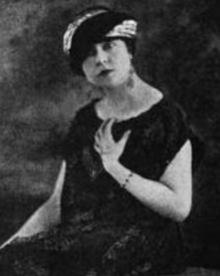Miirrha Alhambra
Miirrha Alhambra | |
|---|---|
 Alhambra, from a 1923 publication | |
| Background information | |
| Birth name | Pauline Joutard |
| Born | 1890 France |
| Died | 1957 |
| Instrument | piano |
Pauline Joutard (1890–1957) was a French-born Mexican pianist who performed under the stage name Miirrha Alhambra.[1]
Her sister Flora Joutard and she had studied in Bad Homburg before touring Europe.[2][3][4] and South America[5][6][7][8][9][10] together in the early 1900s. A friend took her to Mérida to play where she would meet and marry her husband[citation needed], Domingo Fernando Evia y Barbachano (1883–1977), a wealthy Mexican landowner who was a member of two families that have been prominent in the politics and culture of Yucatán since the mid 19th century, one of which, the Barbachanos, has been described as "one of the most powerful of Yucatán’s oligarchy.[11][12][13]
On 30 June 1912, she arrived with her husband and two-year-old son Edgar de Evia in New York City aboard the liner "Progreso".[14]
References
- ^ For information about her recitals in America, both on stage and radio, see the following: The New York Times, 17 June 1928 (p. 133), 13 February 1931 (p. 21), 13 November 1932 (p. X7), and 15 November 1932 (p. 19).
- ^ Breithaupt<, Rudolf Maria (1912). Die natürliche Klaviertechnik. Leipzig: C. F. Kahnt Nachfolger.p.679:[1]
- ^ Nieman, Walter (1919). Meister des Klaviers. Berlin: Schuster & Loeffler. p.225:[2]
- ^ Die Musik Erster Jahrgang, 1901, p. 539
- ^ Elgueta, Sara Guerin de (1928). Actividades femeninas en Chile. La Ilustración.
- ^ Salas, Eugenio Pereira (1957). Historia de la Musica en Chile, 1850-1900. Universidad de Chile.
- ^ Sergio, Montecino M. (1985). Entre músicos y pintores. Editorial Admadeus. p.18
- ^ Brenner, Alfonso Cahan (1967). Pequeña biografia de un gran teatro. Aranciia. p.60
- ^ Universidad de Chile Instituto de Extension Musical, Facultad de (1960). Revista musical chilena. Universidad de Chile. p.63
- ^ Encina, Francisco Antonio; Leopoldo Castedo (1982). Resumen de la historia de Chile. Zig-Zag. p. 253
- ^ Congresoyucatan.gov.mx Archived 2006-11-03 at the Wayback Machine
- ^ Merida.gov.mx Archived 2007-06-30 at the Wayback Machine
- ^ Yucatan.gob.mx. Archived 2007-08-09 at the Wayback Machine The quote is taken from "Tourism 'Wars' in the Yucatan", which is posted on the website of the American Anthropological Association. aaannet.org Archived 2007-10-11 at the Wayback Machine The article was written by Quetzil E. Castaneda, an affiliate assistant professor of anthropology at the University of Washington and the founding director and professor of The Open School of Anthropology and Ethnography.
- ^ According to the ship's manifest, several members of the Evia family immigrated from Mexico to New York at the same time, including her husband's sister Rosario Evia de Espejo with her own husband and children. In the manifest, Alhambra's husband Domingo gave his occupation as farmer. According to the manifest, the family's surname was Evia, not de Evia.
